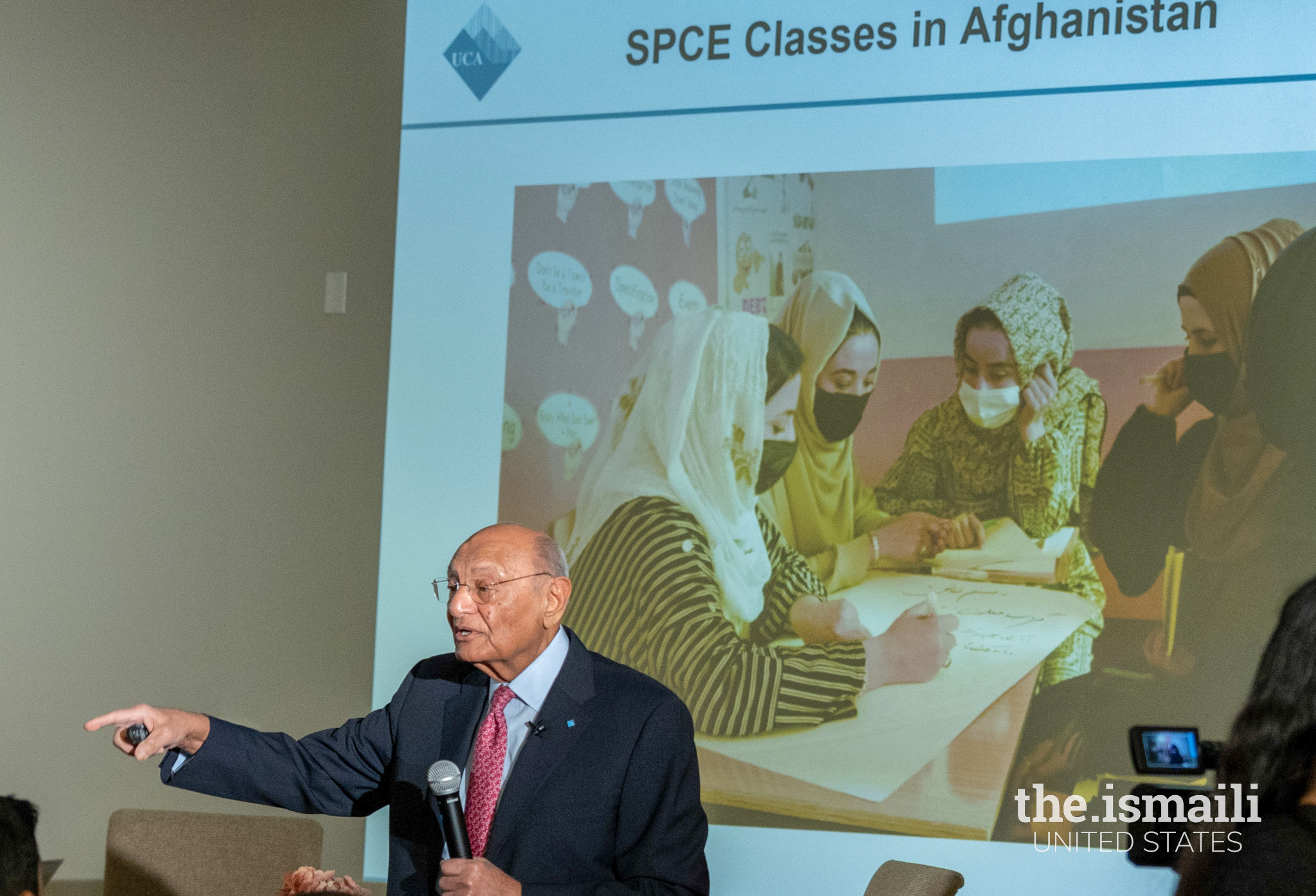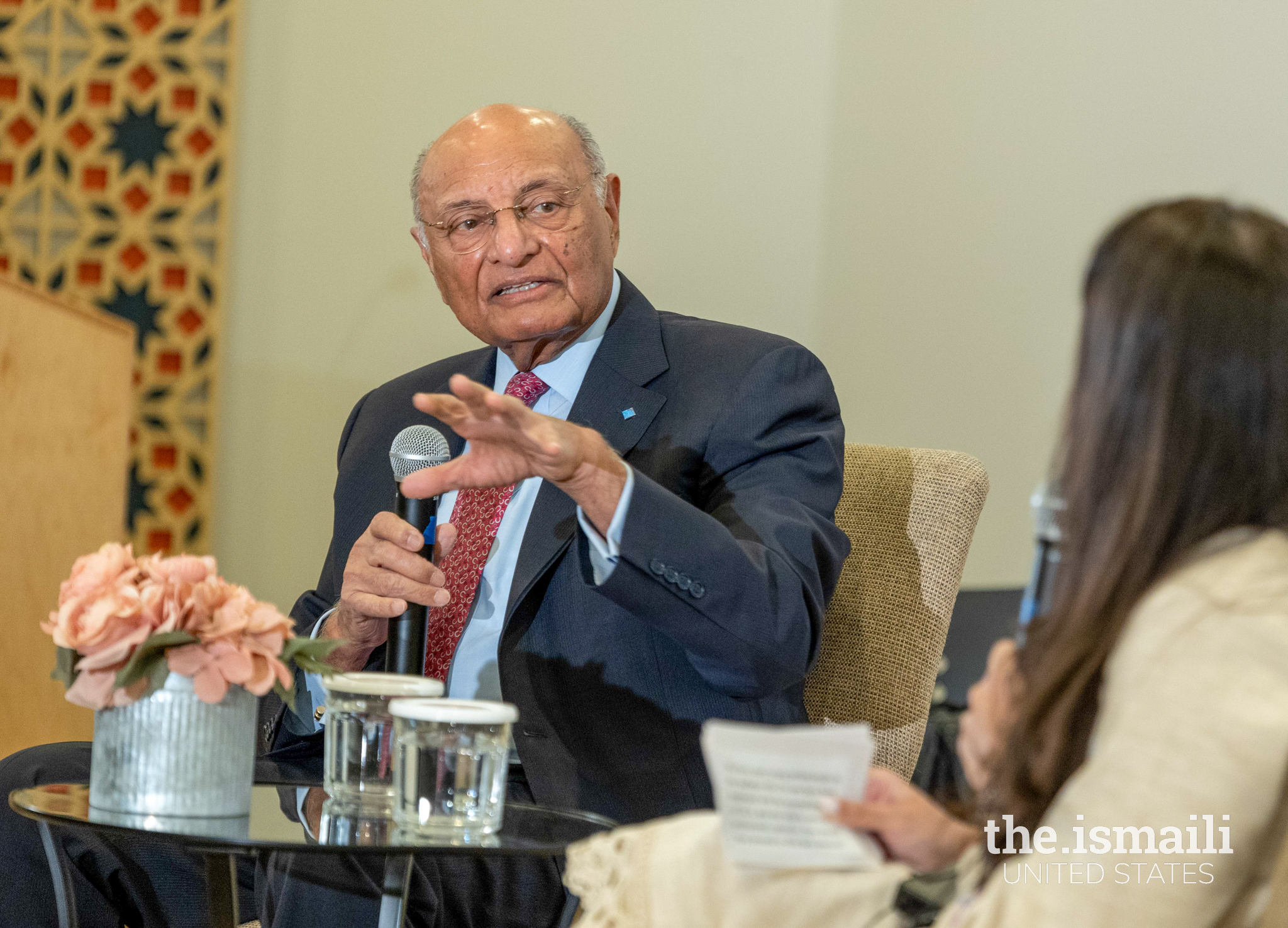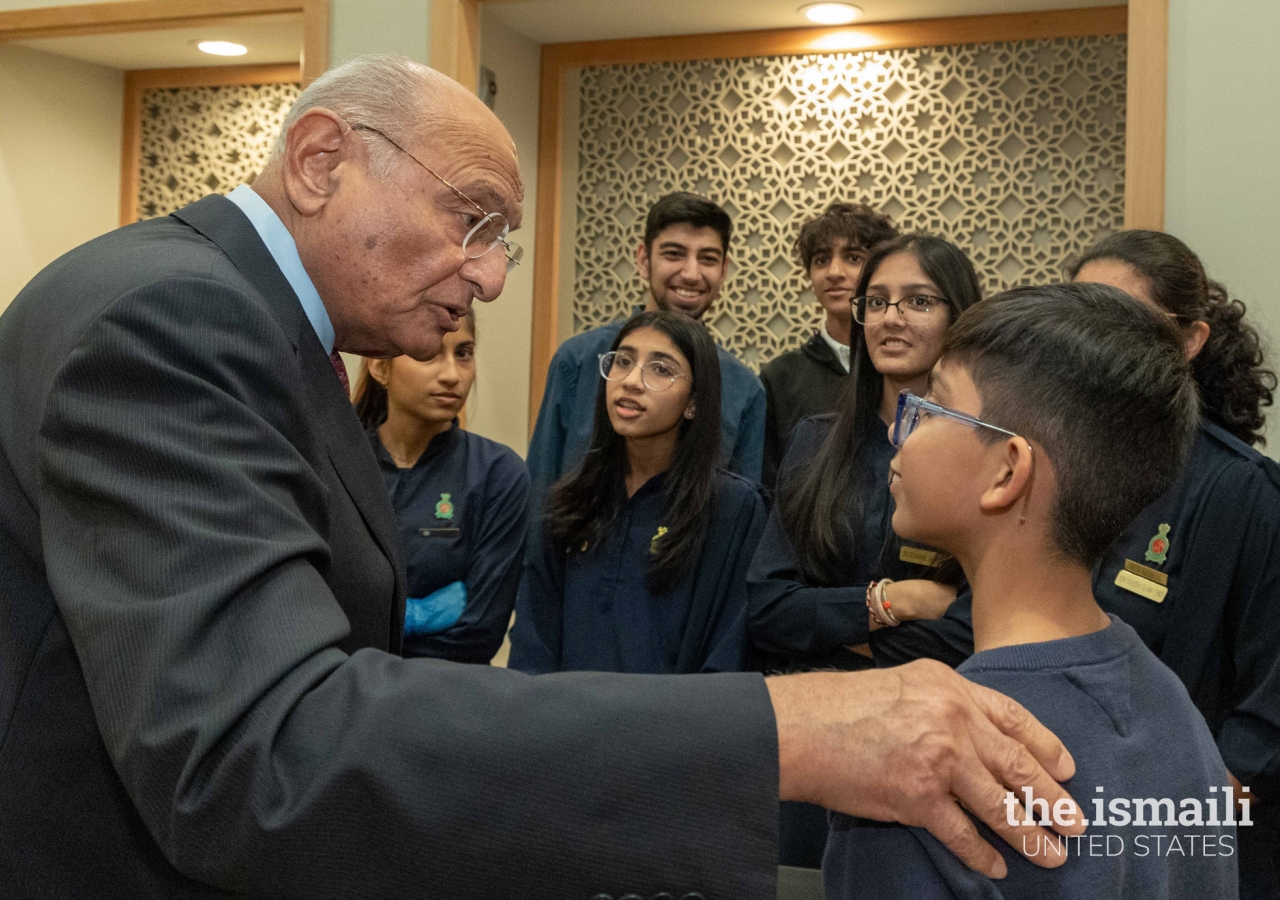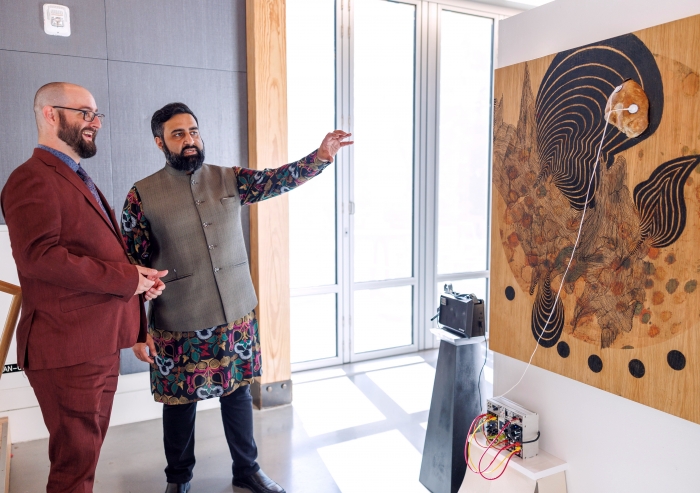To heighten the Jamat’s awareness about the university, discuss its impacts, and share the Imam’s vision for UCA, Dr. Shamsh Kassim-Lakha, Chairman of the Board of Trustees, and Nasir Pirani, Director of Advancement and Public Affairs, visited Atlanta Northeast Jamatkhana at the beginning of 2023.
Members of the Southeast Jamat filled the auditorium and warmly welcomed visitors from UCA. Attendees came not only to hear firsthand accounts about the university’s progress but also to meet Dr. Lakha, whom many of them knew through his decades of service to the Imamat institutions, including as the Founding President of the Aga Khan University and Managing Director of the Aga Khan Fund for Economic Development’s Industrial Promotion Services of Pakistan. Dr. Lakha started by acknowledging volunteers who helped build Imamat institutions.
Referencing the establishment of the Aga Khan University (AKU) some 40 years ago and Mawlana Hazar Imam’s vision to revive the glory that once belonged to the Muslim Ummah through the quality education of its men and women, Dr. Lakha attributed AKU’s success to the establishment of UCA.
“If you look at the Badakhshan regions of Afghanistan, Tajikistan, Pakistan, and China, we have one of the largest concentrations of Ismailis and other Muslims,” said Dr. Lakha. “The UCA and other such higher educational institutions can enable these societies to develop.” He remarked that the establishment and the long-term vision for UCA was one of the boldest decisions made by Hazar Imam.
Dr. Lakha shared the Imam’s inspiring words delivered at UCA’s founding ceremony in 2000:
“By creating intellectual space and resources, this University will help turn the mountains that divide the nations and territories of Central Asia into links that unite its peoples and economies, in a shared endeavor to improve their future wellbeing.”
The attendees learned that congruous to Mawlana Hazar Imam’s vision; most UCA students hail from rural towns, determined not only to further their careers but also to give back to their communities. Responding to a Jamati member who inquired about the careers the Jamat of Central Asia pursue, Dr. Lakha responded that until about the 90s, many people were well-educated and held government jobs. The most popular profession was being an educator, as teachers were well-respected. Now, many educated people run small businesses, and some English-proficient professionals even work in embassies and international organizations.
pic 2035

Students pursuing post-secondary, vocational, or executive training can attend the School of Professional and Continuing Education (SPCE), which boasts 17 campuses: seven in Tajikistan, two in Kyrgyzstan, two in Kazakhstan, and six in Afghanistan. Taught in English, these programs, as well as accompanying hands-on experiences through a variety of co-op placements, professional network connections, and various professional development opportunities, prepare students for the workforce.
Students who attend SPCE aspire to make a name for themselves in their communities. For example, Dr. Lakha enlightened the audience with the story of Munira Mirmamdova, an SPCE graduate, who believed her community would benefit from a coffee shop where people could congregate and enjoy time with each other. Her inspiration rose from coffee shops in countries around the world. After the wide-received success of this endeavor, she built additional restaurants, all located in Khorog, and serving specialty meals to the community.
Jamati members were also informed that beyond undergraduate studies, UCA houses the Graduate School of Development, which focuses on research and comprises the Institute of Public Policy and Administration, Civil Society Initiative, Cultural Heritage and Humanities Unit, the Aga Khan Humanities Project and the Mountain Societies Research Institute – which conducts research to combat the adverse effects of climate change on Central Asia. For example, the glaciers of nearby mountains are beginning to melt, which is cause for alarm and has prompted research to support the region. The Cultural Heritage and Humanities Unit focuses on preserving
Central Asia’s precious culture, with research extending to studying ancient artifacts, including jewelry and pottery, as well as music. Attendees at the talk wondered how students from rural communities could afford such world-class education. Dr. Lakha noted that UCA offers full merit scholarships and need-based financial aid, with most students receiving significant funding. The graduate school also offers full scholarships for doctoral degrees at such places as the University of Cambridge, the University of Alberta, Simon Fraser University, the Czech University of Life Sciences, and Harvard University.
Another attendee asked how individuals avail virtual classes in areas where the internet is limited. Dr. Lakha responded with the solution: they go to the homes of neighbors and friends who can afford it and collectively take classes together. While computers are in limited supply, Jamati members around the world have donated used laptops, Chromebooks, and tablets, etc.
Most promising is that the number of undergraduates has steadily increased each year. However, funding is becoming more difficult since most students receive scholarships and financial aid. Nevertheless, the local population realizes the importance of the university and when possible, contributes to educational expenses.
Image 2080

In closing, Dr. Lakha thanked the Jamat for the Time and Knowledge Nazrana (TKN) volunteers who made the university a stronger institution. Whether in person or remotely, volunteers can help in various areas, including academic program development; construction technology; website design; information technology; emergency planning; human resources; English writing skills; internal audit; and finance. Dr. Lakha shared that UCA is one of the largest beneficiaries of TKN, with over 200 individuals serving in various capacities, either remotely or physically.
The presentation was followed by a fireside chat led by Chairman Mehreen Ghaswala of the Aga Khan Education Board for the Southeastern United States. The discussion included how UCA promotes peace and unites the governments of these countries through an international treaty, encouraging the people of Central Asia to work toward common goals. Another key discussion point was how over 50 percent of UCA students are women who aspire to practice the careers of their choice without gender restrictions.
Chairman Mehreen led the fireside chat, commenting:
“Education has always been a pillar of our faith. However, hearing about the Imam’s time and
energy in building and maintaining the quality of education at UCA reminds us all once again
that it is through quality education that we can truly change the trajectory of lives in remote
communities.”
Hazar Imam’s vision to support students and to encourage them to make a difference in their region is being fulfilled not only through the multitude of UCA programs but also through students’ hard work and volunteers’ dedication. Insh’ Allah, UCA will grow to realize many more successes – for itself and its student body.













